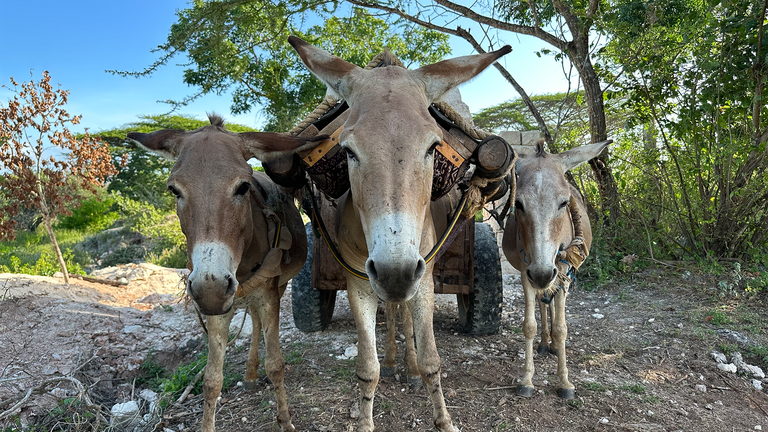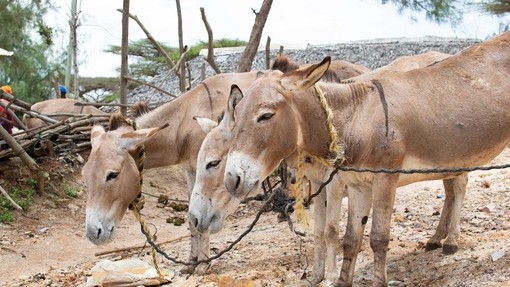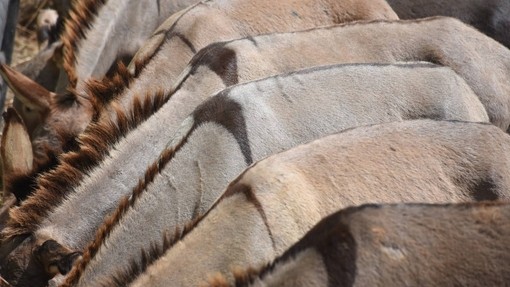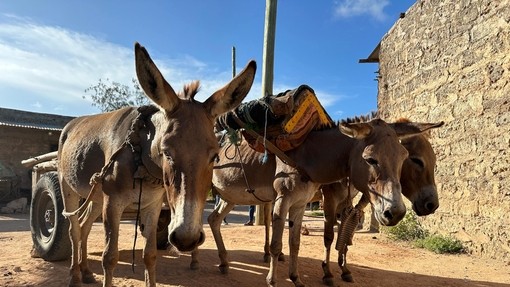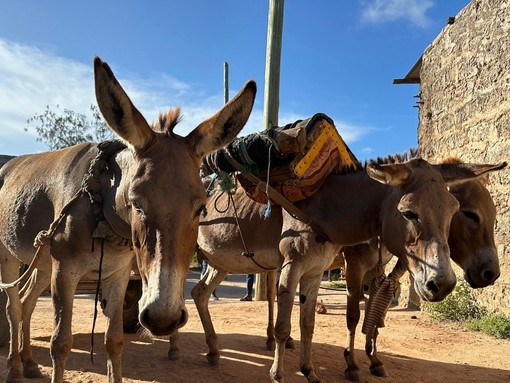
Proposals to stop the slaughter of donkeys and the export of their skins in Brazil and every country in Africa in early 2024 have moved a step closer thanks to the tireless work of The Donkey Sanctuary and partners on both sides of the Atlantic
A report calling for a 15-year ban on the cruel trade has received the endorsement of the African Union’s Specialised Technical Committee (STC) on Agriculture, Rural Development, Water and Environment, and will now be put forward to the Assembly of Heads of States and Governments for adoption in February 2024.
Meanwhile, in Brazil’s Congress, the bill to ban donkey and horse slaughter has passed both the Agricultural and Environmental Commissions, and will now go to the Constitution and Justice Committee.
In both Africa and Brazil, donkey populations face an unprecedented threat by the trade in donkey skins. Donkeys are captured, purchased or stolen, then cruelly slaughtered for their skins to produce a traditional Chinese medicine called ejiao.
Donkeys play a significant role in the cultural heritage of both continents. Across Africa and in parts of Brazil, donkeys provide a lifeline to some of the most marginalised communities on earth, where ownership of a donkey can be the difference between modest survival and destitution.
Legislation in Brazil and Africa is expected to pass in early 2024, and will effectively cut off supply from two of the biggest ‘markets’ in this cruel trade – a move we hope will lead the ejiao industry to look for sustainable and cruelty-free alternatives.
Ian Cawsey, Director of Advocacy and Campaigns at The Donkey Sanctuary, said:
“These proposed measures in Brazil and across Africa have the potential to save the lives of millions of donkeys every year.
“The Donkey Sanctuary’s Stop the Slaughter - End the Donkey Skin Trade campaign is the single biggest donkey protection initiative we have undertaken in 50 years of operation. The ending of slaughter and export of donkey products for the skin trade in 56 countries across two continents is closer than ever and would be a huge milestone on the road to ending the global donkey skin trade.
“We couldn’t have got this far without the help of our partners and supporters and though there is still work to be done to ensure these laws are passed and enforced, this is a huge win that demonstrates growing international recognition of the value of these remarkable and intelligent animals.”
Donkey skin trade milestone in Africa
The ‘Donkeys in Africa Now and in the Future’ report was produced by the African Union Inter-African Bureau for Animal Resources (AU-IBAR) with support from the International Coalition for Working Equids (ICWE), which is made up of The Donkey Sanctuary, Brooke, SPANA (the Society for the Protection of Animals Abroad) and World Horse Welfare.
Dr Otieno Mtula, Regional Campaigns and Advocacy Manager (Africa) for The Donkey Sanctuary, said: “The adoption of this report at the special technical committee session of the African Union last week is a critical and significant milestone on the way to protecting Africa’s donkey populations and the communities that rely on them.
“That it will be considered by the Executive Council of the African Union in February next year is testament not just to the urgency of the issue, but also the collaborative efforts of all those who have worked tirelessly to bring it to the fore.
“The decision taken at the special technical committee session last week gives us confidence that the Executive Council of the African Union will recognize the economic, humanitarian and welfare threat posed by the donkey skin trade, as well as the contribution donkeys make to sustainable economic growth, by committing to a pan-African strategy and a moratorium on the slaughter of donkeys for their skins.”
Brazil donkey skin trade bill approval
Congressmen Nilto Tatto and Matheus Laiola were key in the succession of last week’s bill being passed in the Brazilian capital. They are among a number of congressmen and women who have shown great conviction and leadership in supporting its progress, and a further step towards banning the slaughter of donkeys.
An exhibition showing the cultural importance of donkeys in Brazilian culture, as well as shining a light on the peril faced by of donkeys in the country, was held in the Congress building at the same time. The exhibition, titled - The Donkey is Our Brother, was organised by The Donkey Sanctuary and demonstrated to politicians the true depth and importance of donkeys in cultural life in Brazil, through the work of well-known Brazilian artists and notable speakers.
Speaking at the meeting of the Environmental Commission in Brasilia, Congressman Nilto Tatto said: “The donkey, due to its historical importance, became a symbol of the struggle, strength and resistance of the country people, integrating the imaginary Brazilian and constituting a true historical and cultural heritage.
“However, for some years, donkeys have been captured, transported and confined in waiting farms without observing biosafety and almost always non-existent traceability, and finally slaughtered so that their skin can be exported.
He added: “The reduction in the population of donkeys in Brazil is uncontroversial. Unfortunately, this population decline observed throughout the world and not only in Brazil results from the extractive nature of this activity. Therefore, considering the benefits to donkeys, the health of the Brazilian population, biosafety and our cultural history, we voted to approve this bill.”
Help stop the donkey skin trade
Learn moreShare this page
Tags
- News

